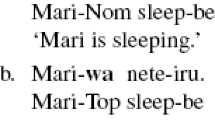Abstract
It is argued that two different types of concept are often intermingled in discussions of Aktionsart. The most common type of classification is one of situation types, relating to the potential actualisation of a situation, although some of the definitions have to do with the actual realization of the situation. This distinction, adequately captured by the notions (a)telicity and (un)boundedness (Declerck 1989), is explored and it is shown how NPs, PPs and tense influence a sentence's classification as (un)bounded.
Similar content being viewed by others
References
Allen, R. R.: 1966,The Verb System of Present-Day American English, Mouton, The Hague.
Aristar Dry, H.: 1983, ‘The Movement of Narrative Time’,Journal of Literary Semantics 12, 19–53.
Bauer, G.: 1970, ‘The English ‘Perfect’ Reconsidered’,Journal of Linguistics 6, 189–198.
Binnick, R. I.: 1991,Time and the Verb — A Guide to Tense and Aspect, Oxford University Press, Oxford.
Brinton, L.: 1988,The Development of the English Aspectual Systems: Aspectualizers and Post-Verbal Particles, Cambridge University Press, Cambridge.
Couper-Kuhlen, E.: 1987, ‘Temporal Relations and Reference Time in Narrative Discourse’, in A. Schopf (ed.),Essays on Tensing in English, Vol. I:Reference Time, Tense and Adverbs, Niemeyer, Tübingen, pp. 7–25.
Couper-Kuhlen, E.: 1989, ‘Foregrounding and Temporal Relations in Narrative Discourse’, in A. Schopf (ed.),Essays on Tensing in English, Vol. II:Time, Text and Modality, Niemeyer, Tübingen, pp. 7–29.
Dahl, Ö.: 1981, ‘On the Definition of the Telic-Atelic (Bounded — Unbounded) Distinction’, in P. J. Tedeschi and A. Zaenen (eds.),Syntax and Semantics, Vol. 14:Tense and Aspect, Academic Press, New York, pp. 79–90.
Declerck, R.: 1979. ‘Aspect and the Bounded/Unbounded Distinction’,Linguistics 17, 761–794.
Declerck, R.: 1989, ‘Boundedness and the Structure of Situations,Leuvense Bijdragen 78, 275–308.
Declerck, R.: 1991a,Tense in English: Its Structure and Use in Discourse, Routledge, London.
Declerck, R.: 1991b,A Comprehensive Descriptive Grammar of English, Kaitakusha, Tokyo.
Dowty, D. R.: 1977, ‘Towards a Semantic Analysis of Verb Aspect and the English ‘Imperfective Progressive’,Linguistics and Philosophy 1, 45–77.
Dowty, D. R.: 1986, ‘The Effect of Aspectual Class on the Temporal Structure of Discourse: Semantics or Pragmatics?’,Linguistics and Philosophy 9, 37–61.
Dry, H.: 1981, ‘Sentence Aspect and the Movement of Narrative Time’,Text 1, 233–240.
Gabbay, D. and J. Moravscik: 1980, ‘Verbs, Events and the Flow of Time’, in C. Rohrer (ed.),Time, Tense and Quantifiers, Nlemeyer, Tübingen, pp. 59–83.
Hatav, G.: 1989, ‘Aspect,Aktionsarten, and the Time Line’,Linguistics 27, 487–516.
Heinämäki, O.: 1978,Semantics of Temporal Connectives, Indiana University Linguistics Club, Bloomington.
Hinrichs, E.: 1986, ‘Temporal Anaphora in Discourses of English’,Linguistics and Philosophy 9, 62–83.
Labov, W. and Waletzky, J.: 1967, ‘Narrative Analysis: Oral Versions of Personal Experience’, in J. Helm (ed.),Essays on the Verbal and Visual Arts, Proceedings of the 1966 Annual Spring Meeting of the American Ethnological Society, University of Washington Press, Seattle, pp. 12–44.
Leech, G. N.: 1971,Meaning and the English Verb, Longman, London.
Mittwoch, A.: 1980, ‘The Grammar of Duration’,Studies in Language 4, 201–227.
Moens, M.: 1987, ‘Tense, Aspect and Temporal Reference’, Ph.D. dissertation, University of Edinburgh.
Mommer, K. E.: 1986, ‘Theoretical Issues Concerning Inherent Aspect and the Perfect in English, Cebaari and Swahili’, Ph.D. dissertation, Northwestern University, Evanston, Illinois.
Mourelatos, A. P.: 1981, ‘Event, Processes and States’,Linguistics and Philosophy 2, 415–434.
Partee, B.: 1984, ‘Nominal and Temporal Anaphora’,Linguistics and Philosophy 7, 243–286.
Reinhart, T.: 1984, ‘Principles of Gestalt Perception in the Temporal Organization’,Linguistics 22, 779–809.
Schopf, A.: 1984,Das Verzeitungssystem im Englischen und seine Textfunktion, Niemeyer, Tübingen.
Shi, Z.: 1990, ‘On the Inherent Aspectual Properties of NPs, Verbs, Sentences and the Decomposition of Perfectivity and Inchoativity’,Word 41, 47–67.
Smith, C. S.: 1982, ‘Aspect and Aspectual Choice’,Texas Linguistic Forum 19, 167–199.
Smith, C. S.: 1991,The Parameter of Aspect, Kluwer Academic Publishers, Dordrecht.
Vasudeva, H. N.: 1971, ‘Tense and Aspect in English’, Ph.D. dissertation, University of Michigan.
Verkuyl, H.: 1972,On the Compositional Nature of the Aspects, D. Reidel, Dordrecht.
Verkuyl, H.: 1989, ‘Aspectual Classes and Aspectual Composition’,Linguistics and Philosophy 12, 39–94.
Zydatiss, W.: 1976,Tempus und Aspekt im Englischunterricht, Scriptor, Kronberg/Ts.
Author information
Authors and Affiliations
Additional information
I wish to thank Prof. Ö. Dahl, Prof. R. Declerck H. Devolder, Prof. J. Lindstedt, R. Vandekerckhove and Prof. E. Vorlat and the two anonymous referees for their comments on an earlier version of this paper.
Rights and permissions
About this article
Cite this article
Depraetere, I. On the necessity of distinguishing between (un)boundedness and (a)telicity. Linguist Philos 18, 1–19 (1995). https://doi.org/10.1007/BF00984959
Issue Date:
DOI: https://doi.org/10.1007/BF00984959




